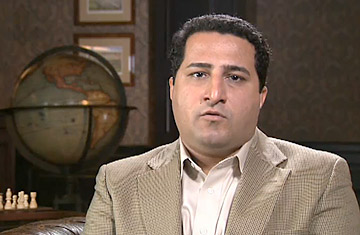
Shahram Amiri
In the 20th century, spying was a hall of mirrors, where reflections — or reflections of reflections — confused agents, double agents and double-crossing double agents. But in the 21st century, the mirrors are gone, replaced with YouTube videos of uncertain provenance but definite confusion. That's certainly the case involving Shahram Amiri, the Iranian physicist who disappeared while on a religious pilgrimage to Saudi Arabia last year, only to resurface Tuesday at the Pakistani embassy in Washington.
Last month, a man claiming to be Amiri appeared on a video for the first time since Amiri vanished while taking a walk near his hotel in the Saudi city of Medina. Appearing to speak into a camera on his laptop, he said CIA agents kidnapped him during his hajj trek last June. "They gave me an anesthetic injection," he said, claiming he had been in Arizona for eight months where he suffered "the most severe tortures and psychological pressures." But in a second, much more well produced video — also posted June 8 — a man claiming to be Amiri and resembling the first, though slightly more heavy set, said he went to the U.S. to continue his education. "I am free here," the second Amiri insisted, "and I assure everyone that I am safe."
According to ABC News, Amiri was the Iranian nuclear scientist who turned over to U.S. intelligence the final jigsaw-puzzle piece that last fall exposed Tehran's second — and supersecret — effort to develop nuclear weapons. But all the pieces were tossed into the air Tuesday with the news that Amiri — unseen for a year — had suddenly shown up at the Iranian-affairs office at the Pakistani embassy in Washington. He was seeking a ticket home. (Since shortly after the 1979 Iranian revolution, when militants seized the U.S. embassy and held 52 Americans for more than a year, the two nations have not had formal diplomatic relations.)
U.S. officials have denied kidnapping Amiri and said Tuesday he can go where he wants. "Mr. Amiri has been in the United States of his own free will," Secretary of State Hillary Clinton said. "And he is free to go." Amiri — one of them, anyway — spoke to the Iranian media by telephone Tuesday. The U.S. "sought to put a cap on the seizure while denying the whole case but eventually did not succeed," he said. "Since the release of my comments on the Internet, the Americans saw themselves as the losers in this saga."
That saga slowly escalated over the past year. Though Amiri disappeared in June, the Iranians waited until September to blame the Saudis for seizing him and then tossed in the U.S. as part of the plot the following month. "We hold Saudi Arabia responsible for Shahram Amiri's situation," Iranian Foreign Minister Manouchehr Mottaki said Oct. 7, "and consider the U.S. to be involved in his arrest."
Though some U.S. officials say satellite imagery was the key to the discovery of Iran's secret nuclear program, ABC News reported in March that Amiri had defected with the CIA's assistance in an "intelligence coup" that helped Washington figure out what Tehran was up to. Amiri allegedly told the CIA about Iran's secret uranium-enrichment plant near the holy city of Qum — intelligence that forced Iran to acknowledge its Fordow plant last September, just as Washington was preparing to reveal it. The U.S. says the revelation will sabotage any plans to use the plant for secret bomb-building if Iran's acknowledged site at Natanz is destroyed. Iran is under U.N. sanctions over its nuclear program, and the U.S. and its allies say the country is intent on developing atomic weapons. Tehran insists it is only developing nuclear capability for peaceful purposes including power generation and medicinal purposes.
The little the Western media knows — or thinks it knows — about Amiri comes from Iranian dissidents. According to those sources, Amiri, now 32, worked as a researcher at Iran's Malek-Ashtar University of Technology, which is connected to Iran's Revolutionary Guard Corps and has been linked to Iran's nuclear program by the European Union. According to the Paris-based National Council of Resistance of Iran, Amiri worked at facilities involved in nuclear-weapons work under Mohsen Fakhrizadeh-Mahabadi, an officer in the Revolutionary Guard and a key Iranian nuclear scientist. Amiri "has important intelligence on the regime's military nuclear activities," according to Shahin Gobadi of the resistance council.
There has been speculation that Amiri's family has been used as bait, both to get him to defect to the U.S. and to return to Iran. For years, the CIA has tried to woo Iranians involved in sensitive matters to defect by reaching out to them via relatives in the U.S. But there also have been reports that members of Amiri's family still in Iran have been threatened with harm unless he returns. His wife has said her husband is "only a researcher and did not hold any government post."
Which brings us back to yet another video. On June 29, a third Amiri clip surfaced on Iranian television. "A few minutes ago I succeeded in escaping U.S. security agents in Virginia," he said in a medium- to poor-quality video. "If something happens and I do not return home alive, the U.S. government will be responsible." This Amiri insisted he had not betrayed Iran. Given the twists and turns of this strange spy saga so far, it's a line Amiri may want to keep practicing as he heads back home.
